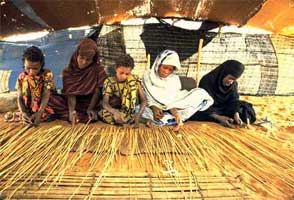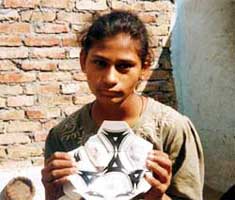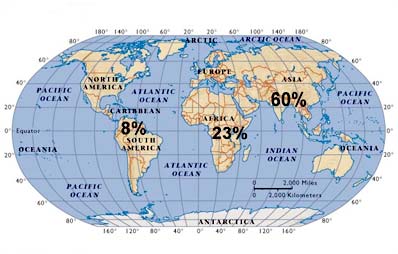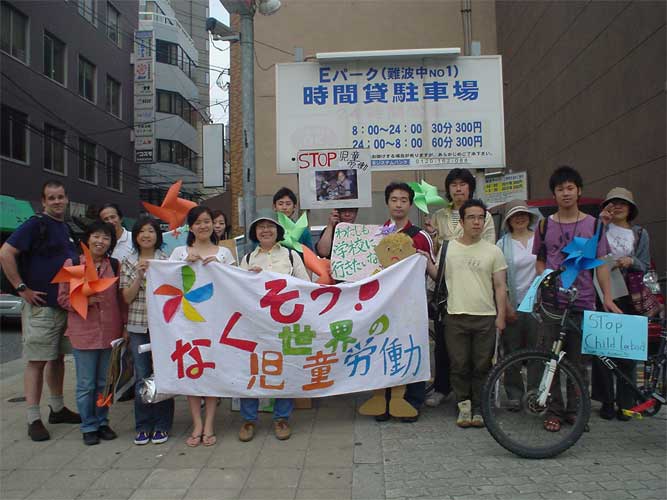Sunday, June 11th, 3:00 pm, Nakanoshima Park
(Near Midosuji line, Yodoyabashi station)
Let's go!


Is globalization a good thing? Many
people think not. Sometimes globalization causes problems. One of them
is the increase
of 'child labor'.
In some countries, children work and don't go to school. Most work in agriculture (farming) for cash crops. A cash crop is a crop made to sell for money, not to eat or trade with. These crops are usually sold to a foriegn country. Sometimes a foriegn company owns the plantation the children work at. Some examples of cash crops are coffee, bananas, or shrimp. Coconut fiber, or 'natadecoco' is a famous cash crop sold to Japan.
Some children work in factories that make things for developed countries like Japan or the U.S.. Some of these factories are very bad and people call them 'sweatshops' (like a hot gymnasium) because they are so hot and the work is so hard. A typical 'sweatshop' is a big clothing factory that makes things for a big company like Nike or Uniclo. Many of the soccer balls we use are made by children. Whether it be cash crops or factories, the children are working to sell things to developed countries. We are partly to blame for this problem.
These 'sweatshops' have been increasing because of 'outsourcing' (out= somewhere else, source= where you get the thing). Outsourcing means when a big company makes a factory in another country because the labor is cheaper there. More and more companies from rich countries are outsourcing and making factories in poor countries. This means there are more and more factories in poor countries, where children have to work and can't go to school.
You may say: They should make a rule to stop this!, but it isn't as easy as that. Sometimes, if they make a rule that children can't work, the children just end up doing even more dangerous things, like prostitution. Other times, they make a rule that any factory that uses child labor will be fined. However, then, the factory simply pays the children less in order to pay the fine. Finally, sometimes if the rules seem to work, like for example, if the workers make a union and get better pay, the big company from the rich country simply moves the factory to another poor country.
You may ask: So, what can we do? Well, the thing that can really change this is public opinion. Nike used to have many sweatshops, but they got a bad reputation because many people held demonstrations. These demonstrations happen all over the world but one very famous one was in Seattle (Mr. Walsh's hometown!) Because of these demonstrations, Nike changed! Really! Uniclo also is very worried about getting a bad reputation so they advertise that they don't make sweatshops.
Some people in Japan and other countries know about this problem and buy things from fair trade companies like the people tree that don't use child labor and pay the workers better than the 'sweatshops'. As mentioned before, there are also many demonstrations against free trade because 'free trade' means that more multinational companies can do things like use child labor in developing countries.
In order to change public opinion, we first need awareness. We will march on Sunday and we will ask people: Do you know about this problem? At the least, people will see our warmth and kindness and they will start to think. It is a start. Let's go!

Resources for essay:
http://www.ilo.org/public/english/bureau/inf/download/child/childday05.pdf
http://acejapan.org/cl-net
http://jicrc.org
or use google to search for 児童労働
fair trade 日本
http://www.fairtradecenter.org/index.htm
http://magman.cocolog-nifty.com/worldfairtrader/cat3726390/
http://www.peopletree.co.jp

In some countries, children work and don't go to school. Most work in agriculture (farming) for cash crops. A cash crop is a crop made to sell for money, not to eat or trade with. These crops are usually sold to a foriegn country. Sometimes a foriegn company owns the plantation the children work at. Some examples of cash crops are coffee, bananas, or shrimp. Coconut fiber, or 'natadecoco' is a famous cash crop sold to Japan.
Some children work in factories that make things for developed countries like Japan or the U.S.. Some of these factories are very bad and people call them 'sweatshops' (like a hot gymnasium) because they are so hot and the work is so hard. A typical 'sweatshop' is a big clothing factory that makes things for a big company like Nike or Uniclo. Many of the soccer balls we use are made by children. Whether it be cash crops or factories, the children are working to sell things to developed countries. We are partly to blame for this problem.
These 'sweatshops' have been increasing because of 'outsourcing' (out= somewhere else, source= where you get the thing). Outsourcing means when a big company makes a factory in another country because the labor is cheaper there. More and more companies from rich countries are outsourcing and making factories in poor countries. This means there are more and more factories in poor countries, where children have to work and can't go to school.
You may say: They should make a rule to stop this!, but it isn't as easy as that. Sometimes, if they make a rule that children can't work, the children just end up doing even more dangerous things, like prostitution. Other times, they make a rule that any factory that uses child labor will be fined. However, then, the factory simply pays the children less in order to pay the fine. Finally, sometimes if the rules seem to work, like for example, if the workers make a union and get better pay, the big company from the rich country simply moves the factory to another poor country.
You may ask: So, what can we do? Well, the thing that can really change this is public opinion. Nike used to have many sweatshops, but they got a bad reputation because many people held demonstrations. These demonstrations happen all over the world but one very famous one was in Seattle (Mr. Walsh's hometown!) Because of these demonstrations, Nike changed! Really! Uniclo also is very worried about getting a bad reputation so they advertise that they don't make sweatshops.
Some people in Japan and other countries know about this problem and buy things from fair trade companies like the people tree that don't use child labor and pay the workers better than the 'sweatshops'. As mentioned before, there are also many demonstrations against free trade because 'free trade' means that more multinational companies can do things like use child labor in developing countries.
In order to change public opinion, we first need awareness. We will march on Sunday and we will ask people: Do you know about this problem? At the least, people will see our warmth and kindness and they will start to think. It is a start. Let's go!

Resources for essay:
http://www.ilo.org/public/english/bureau/inf/download/child/childday05.pdf
http://acejapan.org/cl-net
http://jicrc.org
or use google to search for 児童労働
fair trade 日本
http://www.fairtradecenter.org/index.htm
http://magman.cocolog-nifty.com/worldfairtrader/cat3726390/
http://www.peopletree.co.jp

